
OER Textbook
- Subject:
- Business and Communication
- Marketing
- Material Type:
- Textbook
- Author:
- LUMEN LEARNING
- Date Added:
- 01/25/2022

OER Textbook
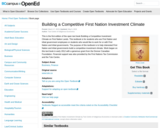
This is the first edition of the open text book Building a Competitive Investment Climate on First Nation Lands. This textbook is for students who are First Nation and tribal government employees or students who would like to work for or with First Nation and tribal governments. The purpose of this textbook is to help interested First Nation and tribal governments build a competitive investment climate. Work began on this text book in early 2012 with a generous grant from the Donner Canadian Foundation. Financial support was also provided by the First Nations Tax Commission and the Tulo Centre.
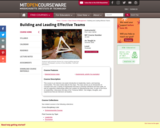
An intensive one-week introduction to leadership, teams, and learning communities. Introduction of concepts and use of a variety of experiential exercises to develop individual and team skills and develop supportive relationships within the Fellows class.
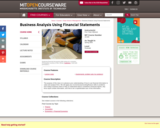
Uses a case approach to develop a framework for business analysis. Provides students with tools for business analysis, including strategic, accounting, financial, and prospective analysis. Concepts are then applied to a number of decision-making contexts, such as credit analysis, investor communications, merger analysis, financial policy decisions, and securities analysis. From the Course Description: Course Description The purpose of this class is to advance your understanding of how to use financial information to value and analyze firms. We will apply your economics/accounting/finance skills to problems from today's business news to help us understand what is contained in financial reports, why firms report certain information, and how to be a sophisticated user of this information.
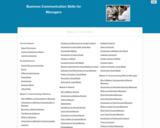
n Business Communication Skills for Managers, students learn how to communicate effectively in business, with an emphasis on the use of these skills managing teams and organizations. The course introduces important elements of successful communication, providing examples of effective communication and providing students opportunities to practice the same. The course covers the essentials of communication including professional writing, visual aids, presentations, speeches, phone and online communication, and both getting hired and finding new hires.
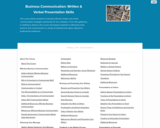
This course allows students to develop effective written and verbal communication strategies specifically for the workplace. From idea gathering to drafting to delivery, this course will prepare students to effectively write, present, and communicate in a variety of methods and styles, tailored to professional audiences.
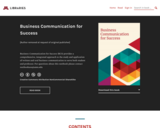
Business Communication for Success (BCS) provides a comprehensive, integrated approach to the study and application of written and oral business communication to serve both student and professor.
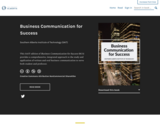
This book, made available by Southern Alberta Institute of Technology (SAIT), is suited for Business Writing, Business English or Business Research/Report Writing courses. This adaptation has reformatted the original text, and replaced some images and figures to make the resulting whole compatible with accessibility software. The adaptation was also conducted in order to provide a greater level of Canadian context. This work was first released in 2019, with major revisions to improve accessibility and migrate to the Pressbooks platform in 2021.
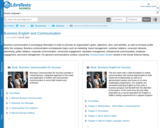
Business communication is exchanging information in order to promote an organization's goals, objectives, aims, and activities, as well as increase profits within the company. Business communication encompasses topics such as marketing, brand management, customer relations, consumer behavior, advertising, public relations, corporate communication, community engagement, reputation management, interpersonal communication, employee engagement, and event management. For general communications content, consult the Communication Studies section in the Social Sciences library.

Business Ethics is designed to meet the scope and sequence requirements of the single-semester business ethics course. This title includes innovative features designed to enhance student learning, including case studies, application scenarios, and links to video interviews with executives, all of which help instill in students a sense of ethical awareness and responsibility.
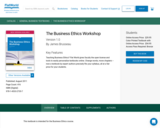
Ethics is about determining value; it's deciding what's worth doing and what doesn't matter so much.Business ethics is the way we decide what kind of career to pursue, what choices we make on the job,which companies we want to work with, and what kind of economic world we want to live in and thenleave behind for those coming after. There are no perfect answers to these questions, but there's adifference between thinking them through and winging it. The Business Ethics Workshop provides aframework for identifying, analyzing, and resolving ethical dilemmas encountered through working life.

Business Law I Essentials is a brief introductory textbook designed to meet the scope and sequence requirements of courses on Business Law or the Legal Environment of Business. The concepts are presented in a streamlined manner, and cover the key concepts necessary to establish a strong foundation in the subject. The textbook follows a traditional approach to the study of business law. Each chapter contains learning objectives, explanatory narrative and concepts, references for further reading, and end-of-chapter questions.
Business Law I Essentials may need to be supplemented with additional content, cases, or related materials, and is offered as a foundational resource that focuses on the baseline concepts, issues, and approaches.
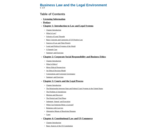
This textbook is used for all sections of Business Law 1 (BA 207) and Business Law 2 (BA 208) at Grand Rapids Community College. It provides context and essential concepts across the entire range of legal issues with which managers and business executives must grapple. The text provides the vocabulary and legal acumen necessary for businesspeople to talk in an educated way to their customers, employees, suppliers, government officials—and to their own lawyers.
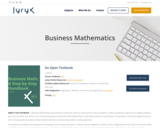
This textbook was written to meet the needs of a twenty-first century student. It takes a systematic approach to helping students learn how to think and centers on a structured process termed the PUPP Model (Plan, Understand, Perform, and Present). This process is found throughout the text and in every guided example to help students develop a step-by-step problem-solving approach.
This textbook simplifies and integrates annuity types and variable calculations, utilizes relevant algebraic symbols, and is integrated with the Texas Instruments BAII+ calculator. It also contains structured exercises, annotated and detailed formulas, and relevant personal and professional applications in discussion, guided examples, case studies, and even homework questions.
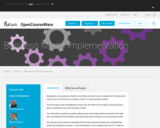
Designing a new business model is one thing, but how do you actually put it into practice? How do you move from your current model to a new business model?
In this business and management course, you will learn how to make a practical action plan to implement your new business model.
You will create a business model roadmap that will include practical activities that take into consideration the possible risks associated with moving to a new business model.
You will also learn about the practical factors that need to be taken into consideration during the transition process, i.e. the competency of your people and your IT, in order to successfully implement a new business model.
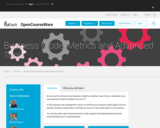
Do you want to enhance your business model by creating a clear focus or implement your new business model innovation into your IT?
In this business and management course, we will discuss business model agility and how specific business model metrics will help you focus on the overall goals of our business.
You will also learn about advanced tools to help support the bridge between business model thinking and IT implementation.
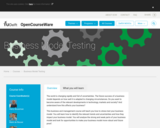
The world is changing rapidly and full of uncertainties. The future success of a business model depends on how well it is adapted to changing circumstances. Do you want to become aware of the relevant developments in technology, markets and society? And understand how this affects your business?
This business and management course will teach you how to stress test your business model. You will learn how to identify the relevant trends and uncertainties and how they impact your business model. You will analyse the strong and weak parts of your business model and look for opportunities to make your business model more robust and future proof.
You will learn through real-world examples from well-known companies and interact with fellow entrepreneurs. By the end of this course, you will be able to stress test your own business model to analyse its future success.
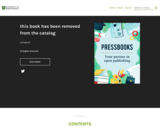
This textbook and its accompanying spreadsheet templates were designed with and for students wanting a practical and easy-to-follow guide for developing a business plan. It follows a unique format that both explains what to do and demonstrates how to do it.
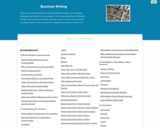
This course allows students to develop effective written communication strategies specifically for the workplace. From idea gathering to drafting to delivery, this course will prepare students to write a variety of documents, including memos, letters, and reports, tailored to professional audiences.
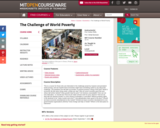
This is a course for those who are interested in the challenge posed by massive and persistent world poverty, and are hopeful that economists might have something useful to say about this challenge. The questions we will take up include: Is extreme poverty a thing of the past? What is economic life like when living under a dollar per day? Why do some countries grow fast and others fall further behind? Does growth help the poor? Are famines unavoidable? How can we end child labor - or should we? How do we make schools work for poor citizens? How do we deal with the disease burden? Is micro finance invaluable or overrated? Without property rights, is life destined to be "nasty, brutish and short"? Has globalization been good to the poor? Should we leave economic development to the market? Should we leave economic development to non-governmental organizations (NGOs)? Does foreign aid help or hinder? Where is the best place to intervene?